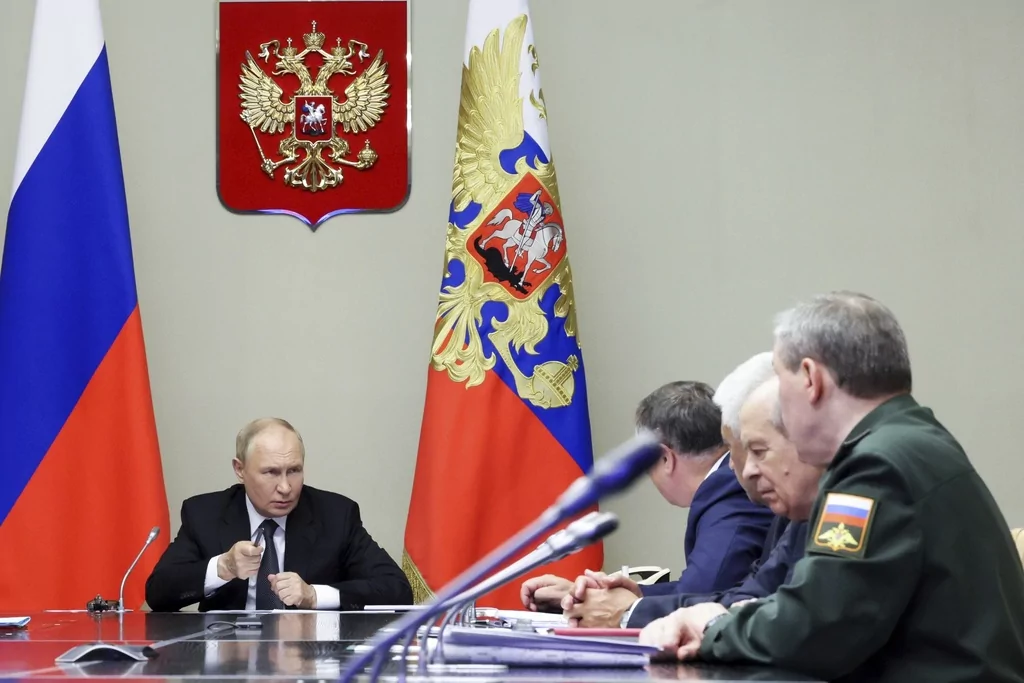
Russia‘s border region authorities must prepare for the possibility that Ukraine‘s military brass expands a dramatic raid beyond Kursk Oblast, according to Russian President Vladimir Putin.
“It is obvious for us that the enemy will continue trying to destabilize the situation in the border regions in order to destabilize the domestic political situation in Russia,” Putin said during a broadcast meeting with regional governors. “Therefore, if the situation in the Bryansk Region is relatively calm today, it does not mean that it will remain the same tomorrow.”
Putin has reason to emphasize the need for Russian officials “to be prepared and resolved in advance” of any impending Ukrainian maneuvers. Ukrainian commanders caught their Russian adversaries off guard last week with an audacious raid into Kursk Oblast, which Ukrainian forces found lightly defended in the initial days of the incursion, resulting in the capture of dozens of prisoners of war, mass evacuations of Russian civilians, and a rolling security and public relations fiasco for the Kremlin.
“As of now about 1,000 square meters of Russian territory has been taken under control,” Ukrainian Gen. Oleksandr Syrskyi, the top officer in the Ukrainian military, said Monday. “The situation is under our control.”

That bold update comes days after Russian defense officials claimed that “attempts by individual units to break through deep into the territory in the Kursk direction are being suppressed.” The sudden arrival and persistence of Ukrainian troops in Russian territory, in the midst of a painful struggle to hold their lines in the face of advancing Russian forces in the Donbas region of eastern Ukraine, forced Putin to convene a meeting of security and civilian officials in an apparent bid to allay domestic discontent.
“It seems the opponent is aiming to strengthen their negotiating position for the future,” Putin said. “Lastly, another clear objective of the enemy is to create discord and division within our society, to instill fear, and to undermine the unity and cohesion of the Russian people. They aim to disrupt the domestic political landscape.”
Ukrainian President Volodymyr Zelensky, who is trying to turn their initial successes to Kyiv’s advantage in talks with both Western backers and prisoner-of-war exchanges with Russia, hailed the operation as “the beginning of the end of [Putin’s] rule” in the Kremlin.
“The disaster of his war. This always happens to those who despise people and any rules,” Zelensky said Monday evening. “Russia brought war to others, and now it is coming home. Ukraine has always wished only for peace, and we will definitely ensure peace.”
The exact objectives remain unclear, but the size of the invading force has raised the possibility that Ukrainian forces intend to remain in Russia.
“It kills the suggestions that [Ukraine should agree to] a truce on the line of contact, where it is at the moment,” a senior European official told the Washington Examiner. “So, Ukrainians can politely ask, ‘did we understood correctly [that the truce should follow] the line of contact running also in Kursk Oblast?’ … It’s not easy to kick them out, if they really have, let’s say, two brigades there.”
That assessment might underestimate the number of Ukrainian troops in Russia, as other open-source information suggests that parts of “at least five different brigades” totaling approximately “10,000-15,000 men” have moved into Kursk, according to Michael Kofman, a Carnegie Endowment senior fellow who is an expert on the Ukrainian military and the conduct of the war in Ukraine. Ukrainian forces could be attempting “at a minimum” to force Russian commanders to lose men attacking Ukrainian positions in Kursk rather than in Donbas.
“The issue is that Ukraine pulled units off the line to do this, and deployed units that were also what Ukraine had available in its reserve,” Kofman said during a War on the Rocks podcast recorded Friday and published Saturday. “And so the question now is, will Russia deploy a substantially larger force to counter this? That is, will it be worth it? What the balance of attrition will be? And most importantly, is it going to force Russia to pull forces from active operations that will materially affect its current advances in Donetsk. … So far, the Russian advance towards Pokrovsk has not stalled. If anything, it’s actually accelerated in the last couple of days.”
That question does not yet have a definitive answer, but some observers in neighboring Baltic states perceive some slackening of pressure from Russian ground forces.
“The number of Russian army attacks remains about a quarter lower than before the Kursk operation,” former Estonian intelligence chief Rainer Saks wrote Monday on social media, adding that a “Ukrainian partisan unit” called Atesh detected the transfer of “a marine unit” away from Pokrovsk. “For the Russian military command, Pokrovsk is a top priority for conducting attacks, and removing troops from this direction indicates serious concerns about the situation in Kursk.”
Saks also acknowledged that “on the Pokrovsk front, the Russian military command has managed to maintain the intensity of the offensive at the previous level.” And Putin, for his part, demonstrated his consciousness that Ukrainian officials want Moscow to divert troops away from Donbas.
CLICK HERE TO READ MORE FROM THE WASHINGTON EXAMINER
“These actions clearly aim to achieve a primary military objective: to halt the advance of our forces,” he said. “The pace of offensive operations by the Russian Armed Forces, volunteers, and veterans has not only remained steady but has actually increased by fifty percent. Our troops are advancing along the entire front.”
The Kremlin could struggle to continue that advance if Russian commanders in Kursk struggle to improvise an effective response. “It’s definitely an operation that, I think, has clear upsides, but also very significant downsides,” said Kofman.







